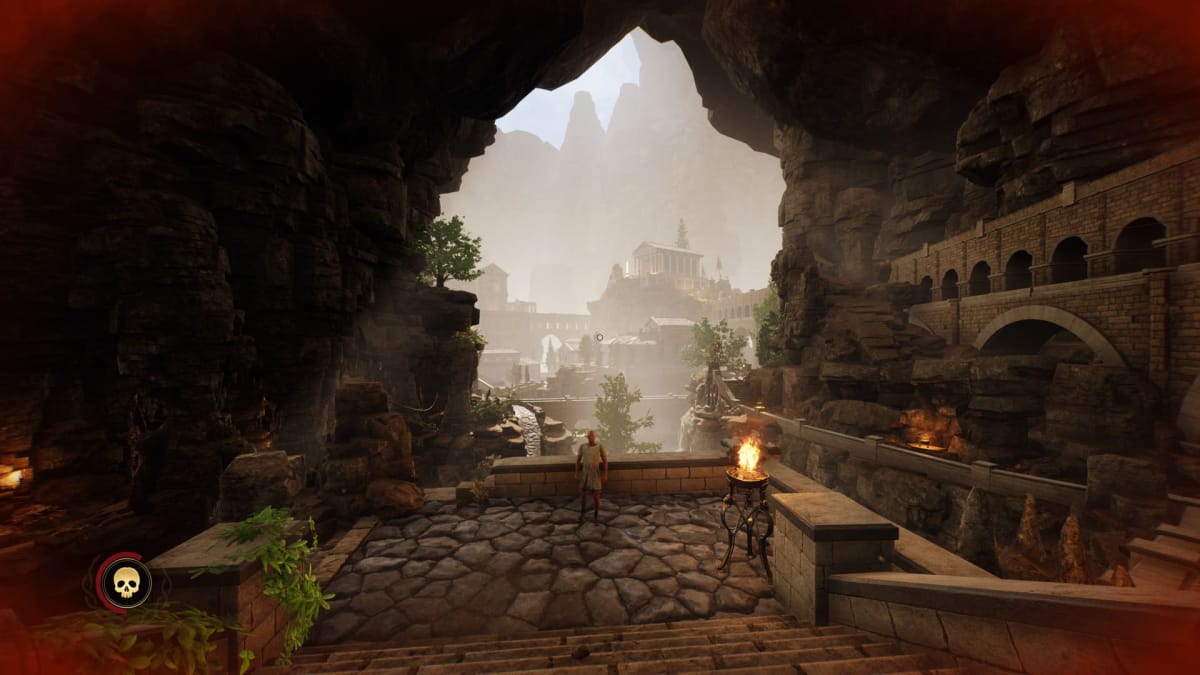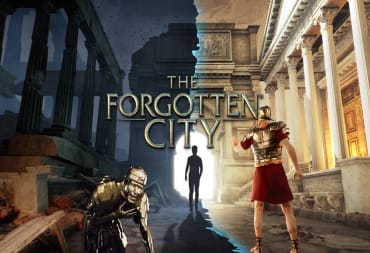If you knew someone who was dying from a sickness, how far would you go to save her life? A merchant just around the corner has the life-saving medicine, but he’s asking for an absurd, nearly impossible price. Do you scrounge up the fee? Do you steal the medicine? Do you let the sick woman die? That’s just one of the many situations The Forgotten City presents you with, and the choices only get harder from there.
Player choice plays a big role in what makes video games so powerful. Games have made strides toward codifying morality, building it into the mechanics using numbers and colors. Commander Shepard gets Paragon and Renegade points to measure their morality in Mass Effect. Fallout: New Vegas tracks your “karma” and features an elaborate system that measures your reputation with various factions. Often, games will explicitly decide what actions are “good” and “bad,” and you have to play along. The Forgotten City, however, asks players to determine good and evil for themselves.
Getting the canon ending of The Forgotten City can take less than 10 hours. In that time, it encourages players to think about ethics on their own. It touches on concepts like deontology and moral relativism without feeling like a lecture — or a stats-driven video game. Furthermore, it encourages players to ask, who deserves to make the rules? and why do humans owe it to one another to follow them?
Warning: This post contains spoilers for The Forgotten City.
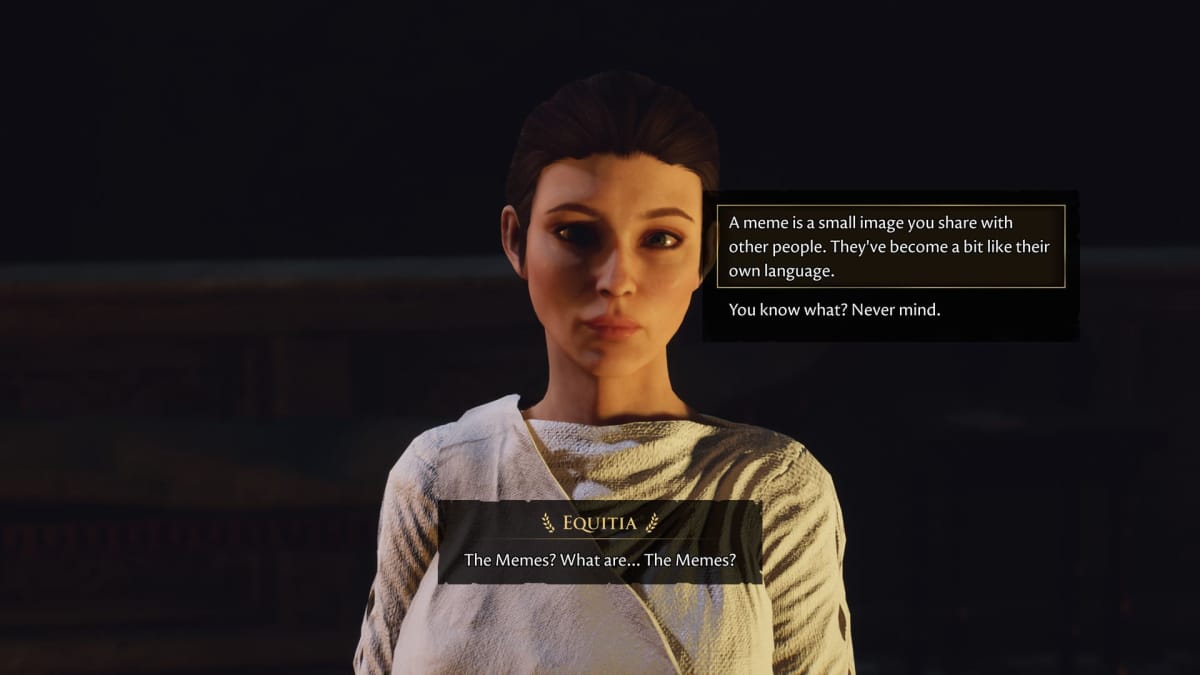
“The Many Shall Suffer For the Sins of the One”
The Forgotten City is billed as a non-linear mystery adventure game. You travel 2,000 years into the past and stumble upon an ancient Roman city, hidden and secluded from the rest of the world. You're greeted immediately by Galerius, a garrulous, kind-hearted farmhand who shows you around. He leads you to Magistrate Sentius, the leader of the small city who knows you're from the future. He tasks you with one mission: Find out who’s about to break the Golden Rule.
The Golden Rule has gone by different terms throughout history, but everyone gets the gist: Treat others the way you want to be treated. It’s simple to grasp. The Forgotten City’s Golden Rule adds a twist, making it more cryptic and ominous. Long ago, the god watching over this place decreed, “The many shall suffer for the sins of the one.”
When someone sins, the golden statues in the city come to life, attacking everyone with divine arrows that turn them to gold. If, and when, that ever happens, Sentius can open a portal at the Shrine of Proserpina that sends you back in time, and your investigation starts over again — or continues, depending on your perspective.
The in-game Golden Rule bears the same simplicity as the one we know in reality. It’s easy to grasp, but it also strips us of any context. After all, a central question takes root: What is a sin?
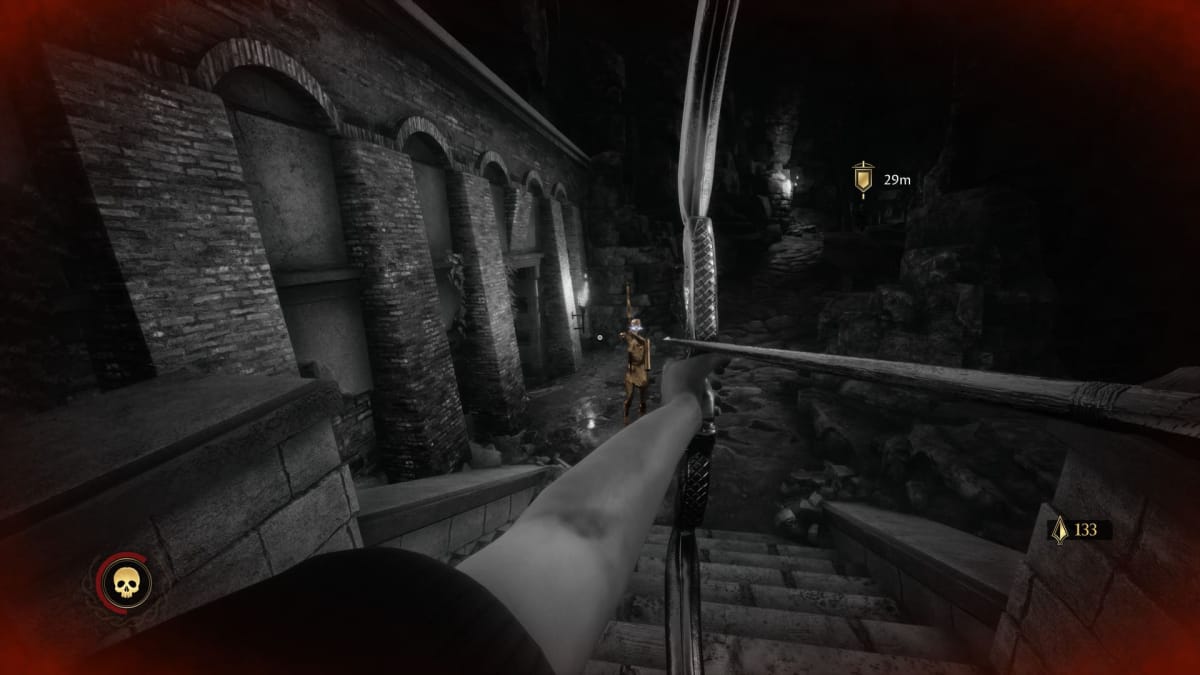
Exploring Sin Through Time Travel
We all walk into The Forgotten City with our own preconceived notions of what a “sin” is. Some of them might be nearly universal, like killing and stealing. Out of curiosity, one of the first things I did was steal some of Sentius' money — an option clearly labeled with red text that read "(steal)." I didn't know whether I needed the money, but I wanted to know what "the many shall suffer" meant. Without fail, the many did suffer. The golden statues came to life, and Sentius immediately opened a portal.
So this city's god definitely considers stealing a sin, and murder falls in the same bucket. After all, humanity has codified laws against those actions since the age of King Hammurabi in Babylon. While the threat of death weighs heavy, you have a time loophole. Your character lives free of consequence, as long as you can make it to the portal. It’s like a faux fail state; the game slaps your wrist while slipping a second chance in your hand. That mechanic creates an intellectual sandbox for you to question the Golden Rule. "If I do this, would a higher power call it a sin?"
Take lying for example. Everyone lies in The Forgotten City. You're always uncovering truths that others would rather keep hidden. Your character can lie through dialog options too. It can be as simple as a decision between, "Sure," and "Sure (lie)." If you pick the latter, does that make your character a sinner? You’re free to find out, since you can reset the timeline anyway.
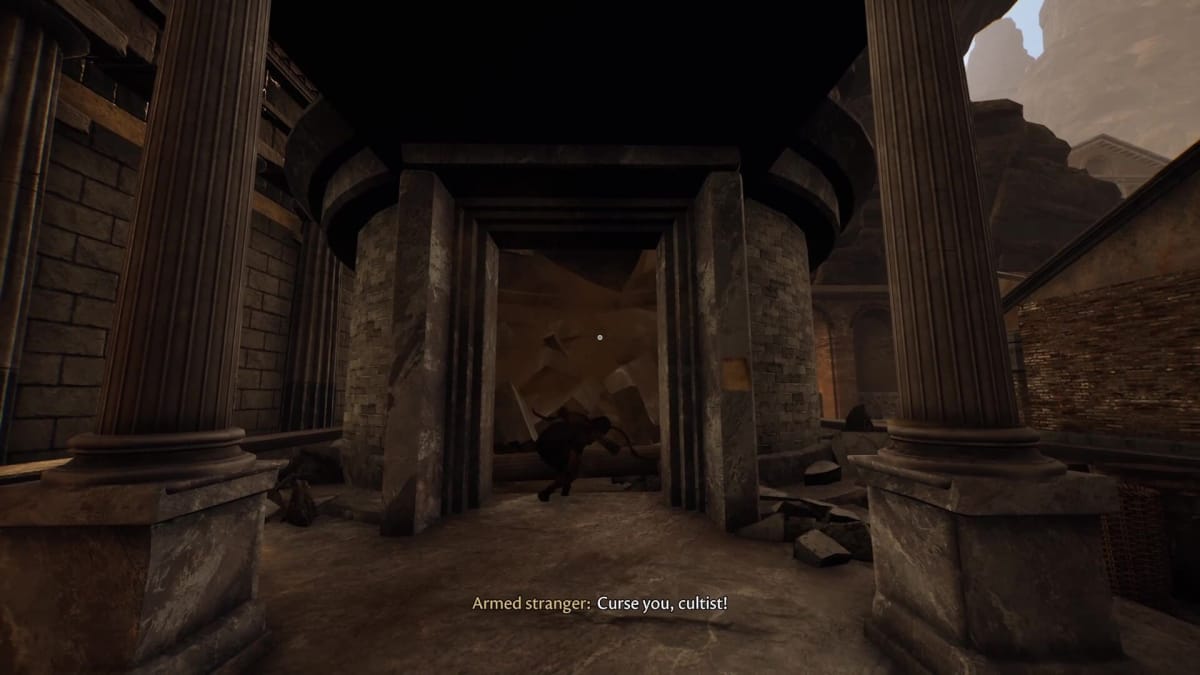
What if your lie gets someone killed? An assassin shows up during your time in The Forgotten City, and he asks you where to find his target. If you let him go about his business, he’ll kill someone, breaking the Golden Rule and effectively killing everyone else. It’s worth noting his target is a slave owner, a liar, and an arsonist who destroyed two-thirds of Rome, if that changes anything for you.
However, you can lie and send the assassin to a shrine — one that’s prone to collapse. As a time traveler, you know without a doubt that it will crumble, and your lie leads him to a sure death. Is that murder? Well, it depends. Fabia, a local baker, will ask if you knew the shrine would collapse. If you say yes, the golden statues come to life, signaling that you’ve done a “bad” thing. If you rewind time, lie, and say no, she’ll nod and wink, and everything remains calm thanks to plausible deniability. The sin of lying covers up the sin of murder, but you don’t get punished for either.
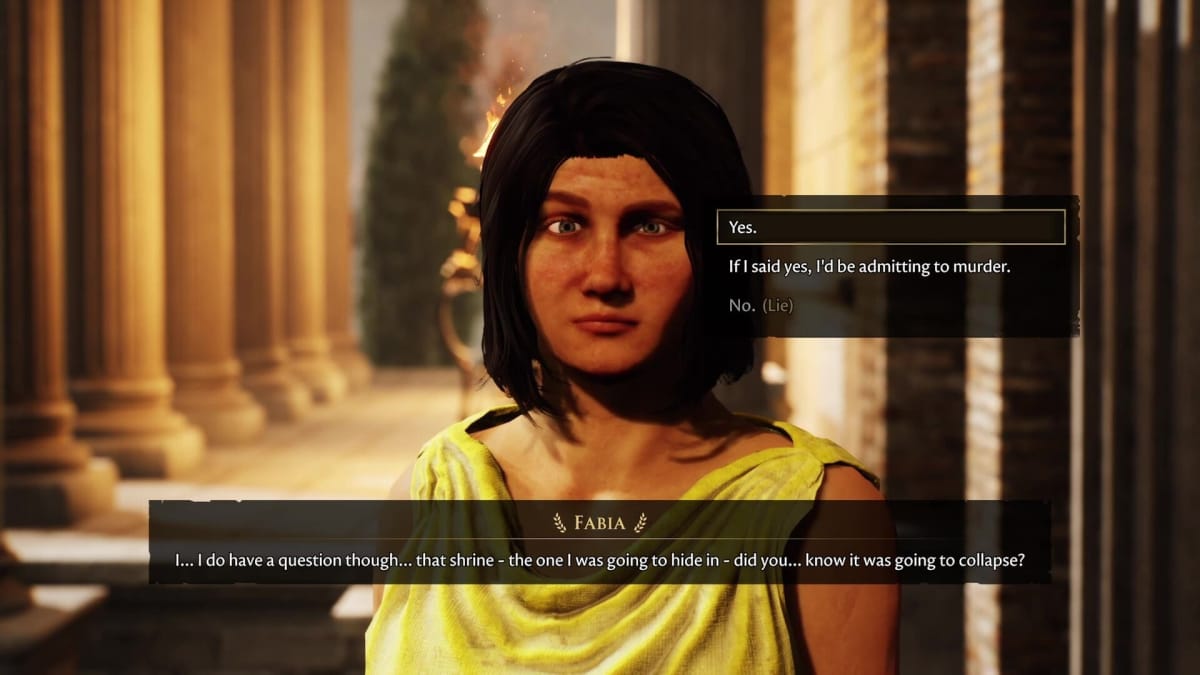
You can steal the dead assassin’s bow for yourself without invoking any wrath, too. Perhaps the god doesn’t consider it stealing, since dead bodies can’t own anything. However, looting from the dead — especially mere seconds after causing the death — doesn’t exactly fall on the “morally righteous” side of the spectrum. Furthermore, the city’s magistrate completely outlawed all weapons. Owning a bow breaks society’s laws, but it doesn’t break any laws in the eyes of the divine. So whose laws are more “morally righteous”? That’s really up to you to ponder, because the game won't give you any karma points one way or the other.
Through all these conundrums, The Forgotten City will never call you a good or bad person. The only feedback you get is an update to your quest log. You’re left to think about the consequences of your own actions. The time loop mechanic serves as a way to solve puzzles and try new strategies, but it also lets you explore the limits of the Golden Rule. After all, if a morally uptight god thinks it’s OK to lie, cover up a murder, and loot from the dead, then you, the player, shouldn’t have a problem with those actions either, right?
The Morals of Gods and Humanity
The Forgotten City raises a lot of philosophical questions, but its canon ending provides some answers — though they might leave you with even more to think about. During your investigation, you’ll come across lots of unscrupulous folks. These people make questionable, arguably immoral decisions, yet they haven’t incurred the wrath of the Golden Rule. The more you explore the city, the more everything feels off kilter. It all comes to a head in the canon ending, when you confront the god watching over everyone: Pluto — or Hades, or Osiris, or Nergal, or simply, the God of the Underworld.
You’ve been playing the game according to his rules, but to win, it’s not about following them to make the "good" decisions. You need to rewrite the rules entirely.
In the closest thing this game has to a “final boss fight,” your last challenge in The Forgotten City is a philosophical battle of wits with Pluto. You, a mere mortal, challenges a god regarding his enforcement of the Golden Rule. In Pluto’s eyes, the Golden Rule is intended to be vague yet simple because every human should possess the mental tools to make the morally righteous choice in every situation. In other words, it’s not his fault that humans continuously break his rules; they simply lack the ability to divine his concept of right and wrong.
The core questions of The Forgotten City take centerstage once more: What is a sin? Who deserves to decide that? Can “sins” be justified in certain situations? By now, you probably have your own answers to those questions, and it could very well be different from another reader’s or my own. Nonetheless, it’s clear that humans have different definitions for “good” and “bad” based on personal perceptions and surrounding context. When one omnipotent entity enforces its moral code across the gamut, it inevitably leads to more sin, pain, and suffering.
Even if that being is truly omnipotent, does that mean their logic is infallible and flawless? Pluto may be a god with wisdom beyond any human’s capacity. His theoretical ideas of “sin” may seem sound, but they fail in execution. The merchant still set impossible prices for life-saving medicine, leading to someone's death. The newly arrived stranger still told a lie that got an assassin killed. Yet, neither of them suffer the consequences of the Golden Rule.
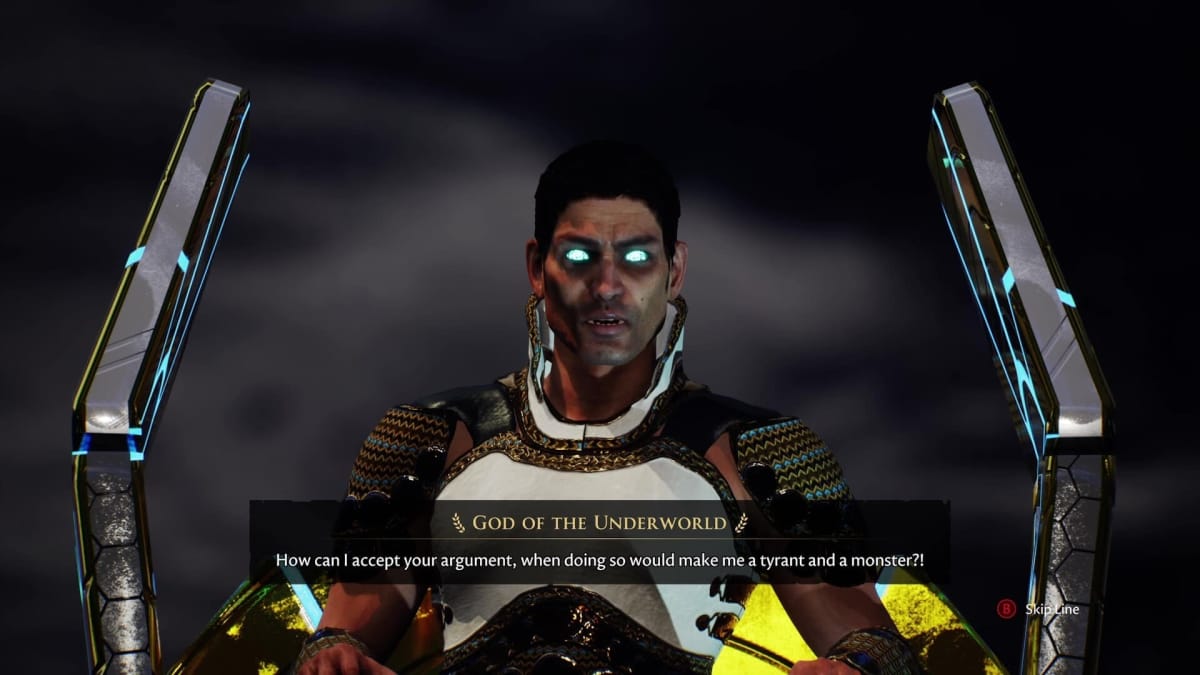
You’ve been playing the game according to his rules, but to win, it’s not about following them to make the "good" decisions. You need to rewrite the rules entirely. Best of all, you don’t need superhuman strength or a magical artifact to "win." You just think things through with logic, empathy, and ingenuity — the basic tools that all humans have for making morally righteous choices.
Philsophy and Morality in The Forgotten City
The Forgotten City leaves you with philosophical quandaries to chew on, but it doesn’t quite push you toward any specific ideology. Instead, it gives your minds the tools to wander and reconsider what morality means in video games.
Looking back, Mass Effect 2 tells you you’re a good person when Commander Shepard endorses their favorite store on the Citadel. After all, you get the shiny blue Paragon points. But Shepard tells every store on the Citadel the same thing, just to get a discount. BioWare may hand over the Paragon points, tacitly calling your actions morally good. But maybe those who make the rules of the game aren’t infallible, much like Pluto in The Forgotten City.
Now that The Forgotten City has stepped outside of its initial boundaries as a Skyrim mod, it roots its setting in history and mythology. By grounding itself more in reality, its thought-provoking nature hits so close to home. The entire game feels like having a Socratic discussion with a philosopher. The goal isn’t to convince someone of one true moral code, but rather to encourage people to take a step back and think about their own values. After all, when it comes to the Golden Rule, only you can decide for yourself what a sin is.
What do you think about The Forgotten City? Let us know in the comments below.
Have a tip, or want to point out something we missed? Leave a Comment or e-mail us at tips@techraptor.net
